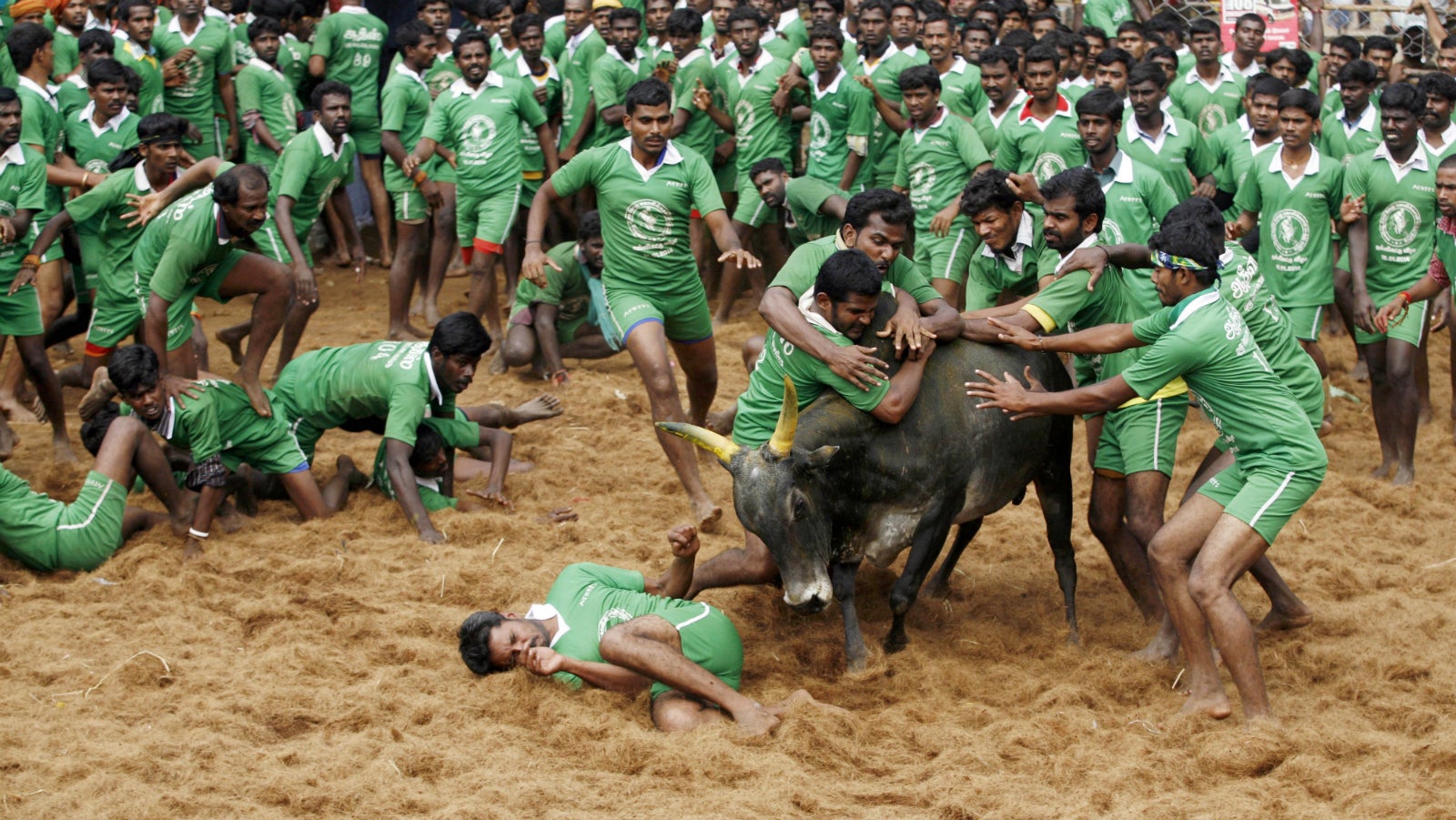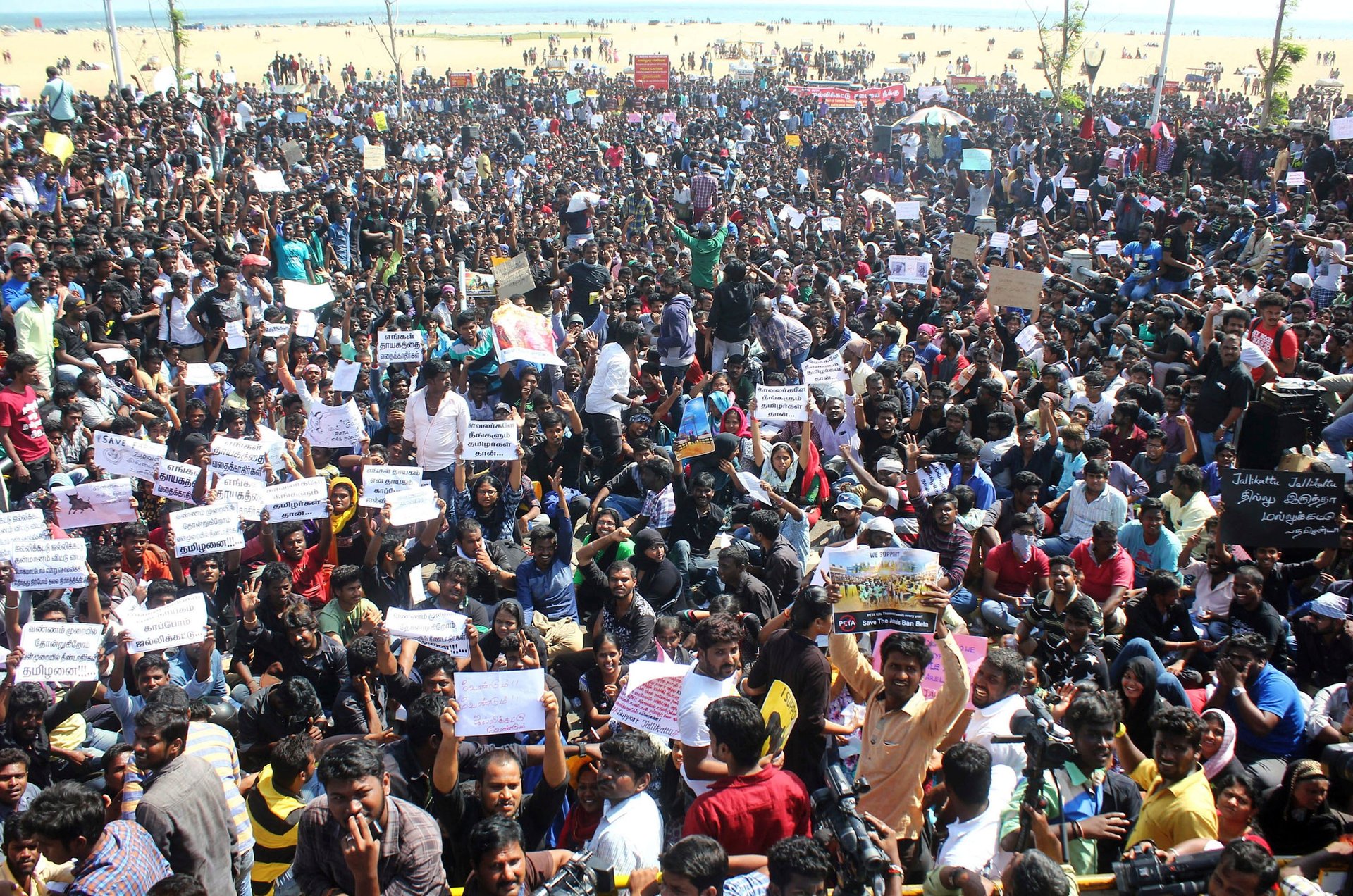One of India’s most developed states is breathing fire over a ban on its ancient bull-taming sport
Southern India’s Tamil Nadu, one of the most socially and economically developed states of the country, is witnessing a groundswell that has united its farmers, youth, top filmstars and politicians.


Southern India’s Tamil Nadu, one of the most socially and economically developed states of the country, is witnessing a groundswell that has united its farmers, youth, top filmstars and politicians.
Since Tuesday night (Jan. 17), more than 5,000 people, mostly youngsters, have been camping at the six-kilometre-long promenade along the Marina Beach in the capital, Chennai, to protest against a ban on a popular bull-taming sport. Angry gatherings have also been reported from other major towns of the state, such as Madurai, Coimbatore, Trichy, and Salem. So widespread is the anger that some newspapers are even referring to it as Tamil Nadu’s version of the Arab Spring.
The agitation is directed against the ban on Jallikattu, an ancient agricultural sport that is an inseparable part of the state’s harvest festival, Pongal. The ban has now pitted animal rights activists and India’s top courts against the state’s very identity.
Following complaints of cruelty towards animals, India’s supreme court (SC) had in 2014 prohibited Jallikattu, a part of Tamil culture for thousands of years. The sport involves men chasing and taming a raging bull.
The protesters believe the ban is an invalidation of the Tamil identity. They now want the Narendra Modi-led central government to pass an ordinance to lift the ban. Besides, they also want the People for the Ethical Treatment of Animals (PETA), on whose petition the SC passed the order, banned as well.
“The democratic protests by students and people to uphold our rights and guard our culture are expressive of our feelings (on Jallikattu),” O Panneerselvam, the Tamil Nadu chief minister, said on Jan. 18.
Quite similar to the Spanish running bulls—except that the animal isn’t killed—Jallikattu sees entire villages coming together to tame raging bulls. Often the main street of the village becomes the track and the bulls are released into it through a special entrance. To win, the players must pounce at it and try to hang on to its hump for about 15-20 metres, or for three jumps by the rampaging bull.
The winner gets prizes ranging from bicycles to gold coins. If no one wins, it is the bull’s owner who takes the prize.
The all-male sport, which is also a public demonstration of machoism, is played mostly in rural Tamil Nadu immediately after the harvest festival of Pongal that falls in mid-January. The Jallikattu of Alanganallur in Madurai district, Tamil Nadu’s cultural capital, is considered the most famous of them all.
Since 2004, however, the sport has come under scrutiny. That year, a bull rammed into spectators, killing a 14-year-old boy. The boy’s father petitioned the courts against the tradition, following which the state government banned Jallikattu, but this was reversed in 2005.
In 2014, however, the SC banned the sport following concerns of cruelty raised by animal welfare groups. One such group, PETA, documented the practices associated with Jallikattu, such as breaking and biting the bull’s tail or the force-feeding of liquor.
In its order, the SC said:
“Forcing a bull and keeping it in the waiting area for hours and subjecting it to the scorching sun is not for the animal’s well-being. Forcing and pulling the bull by a nose rope into the narrow, closed enclosure or ‘vadi vassal’ (entry point), subjecting it to all forms of torture, fear, pain, and suffering by forcing it to go into the arena and also over-powering it in the arena by bull tamers, are not for the well-being of the animal.”
Last year, the Narendra Modi government had issued a notification that permitted Jallikattu, but it was struck down by the SC. This year again, the court rejected a plea seeking to allow Jallikattu during Pongal. Since then, political parties and prominent film stars, including the likes of Rajinikant and Kamal Haasan, have openly come out in support of the sport, which they believe is a symbol of Tamil pride.
“We will make legal efforts to prevent PETA, a foreign organisation, from involving in activities inimical to the cultural pride of Tamil Nadu,” VK Sasikala, general secretary of the state’s ruling AIADMK party, said in a statement. Her political opponent, MK Stalin, a former deputy chief minister and the working president of the opposition party DMK, has called the ban “an attack on our tradition.”
Tamil Nadu is a high performer on economic and social fronts in India. It has the second-highest gross state domestic product (GSDP) at Rs5.15 lakh crore (fiscal 2015), which is expected to grow at 8.79% in fiscal 2016 (pdf). In 2015, industry body Associated Chambers of Commerce & Industry said Tamil Nadu was the topper among all Indian states on eight out of nine parameters, including economy, power, roads, and health.
However, this statewide protest comes at a time when Tamil Nadu is battling an agrarian crisis.
Earlier this month, all its districts were declared drought-hit following the worst northeast monsoon in 140 years. Jallikattu supporters argue that the ancient sport helps poor farmers fetch a fortune—best-performing bulls earn a premium during breeding season—and helps preserve the state’s indigenous cattle breeds that have been fighting competition from imported ones.
However, as the bulls can’t argue in a court of law, the debate over Jallikattu is likely to continue for a long time.
